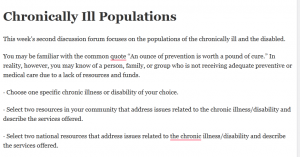Chronically Ill Populations
Applied Science Homewwork Help
This week’s second discussion forum focuses on the populations of the chronically ill and the disabled.

You may be familiar with the common quote “An ounce of prevention is worth a pound of cure.” In reality, however, you may know of a person, family, or group who is not receiving adequate preventive or medical care due to a lack of resources and funds.
· Choose one specific chronic illness or disability of your choice.
· Select two resources in your community that address issues related to the chronic illness/disability and describe the services offered.
· Select two national resources that address issues related to the chronic illness/disability and describe the services offered.
· Analyze whether or not the continuum of care services are adequate for the population with the chosen chronic illness/disability. Explain why or why not.
Your initial contribution should be 250 to 300 words in length. Your research and claims must be supported by your course text and at least one other scholarly source. Use proper APA formatting for in-text citations and references as outlined in the Writing Center.
Guided Response: Review several of your classmates’ posts. Provide a substantive response (minimum of 100 words) to at least two of your peers. Are there any similarities and/or differences between your communities or states? Do you agree or disagree with your peers’ findings on adequacy?
Search entries or author Filter replies by unreadUnread Collapse replies Expand replies
ReplyReply to Week 2 – Discussion 2
COLLAPSE SUBDISCUSSION Rebecca Wilson
Rebecca Wilson
Jun 1, 2022Jun 1 at 8:22am
Hello Class,
Welcome to your second discussion for week 2. I am eager to get the discussions going!
Many people assume all dementias are Alzheimer’s related but, in fact, there are a number of different types and causes. You can learn more about these at www.Alzheimers.gov (Links to an external site.) if you are interested.
There are a number of services which are somewhat helpful but none of them provide low-cost in-home care for those who don’t wish or are not ready to move to a nursing home. In 2013, Medicare and Medicaid began providing in-home coverage because it helps keep people out of nursing homes for a longer period of time which means less money is spent caring for the people who need a little bit of help but not at the level offered in nursing homes. Some of the services are Hospice, which requires the person to have a terminal diagnosis with a life expectancy of no more than six months, and there has to be clearly defined declining health. It is my understanding that Hospice has people who may help with activities of daily living, but I am not positive of that. It’s certainly worth pursuing. Medicaid is the state aid healthcare program. Nearly all of that person’s financial resources have to be used first and the application process is a bit challenging. Medicaid will allow a person’s funeral expenses to be kept if the funeral has been pre-paid. The funeral home where the pre-planning occurred has to provide documentation to Medicaid which can also complicate the process. In my state, Medicaid allows the living spouse to remain in the home till they pass away. A lien is put on the estate of the person who went to the nursing home so that Medicaid can recovery some or all of the money spent on that person’s care. If the estate does not cover the full cost, the money paid for a Medicaid recipients healthcare and nursing home costs is derived from our taxes. Steps you can take in advance of needing care yourself are to prepare legal documents, such as:
· durable power of attorney which allows someone to handle your finances if you are incapacitated
· medical power of attorney which allows someone to make medical decisions for you if you are incapacitated
· living will which clearly defines what kind of care you do and do not want if you are in a terminal health situation
· final will
Other steps you may want to take are to purchase long-term care insurance before you turn 50. You may also want to pre-plan and pre-pay for your own funeral.
When answering the questions be sure to use your critical thinking skills, be sure to use and cite references to give your response merit. Also, be sure to respond to at least two peers.